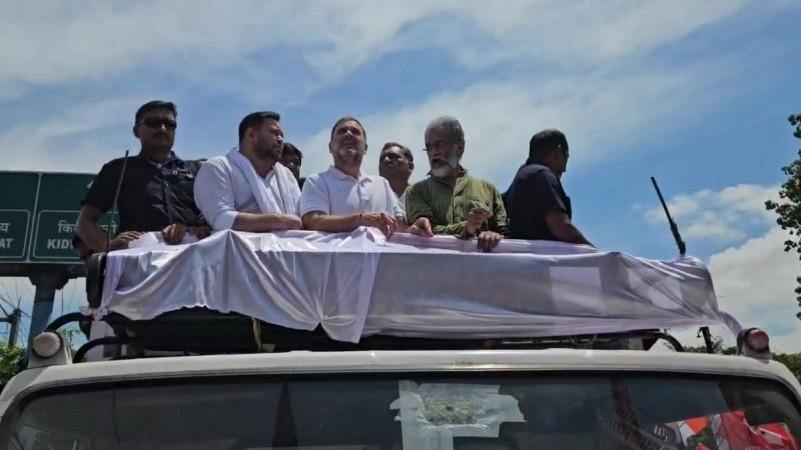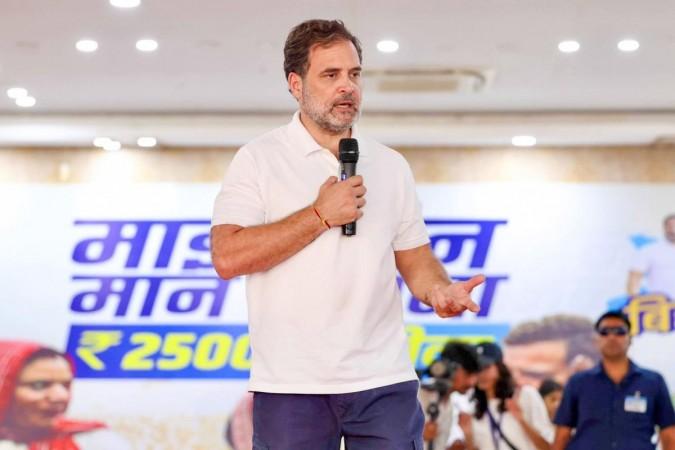
The state of Bihar was engulfed in a significant political protest on July 9, as the Grand Alliance, known as the Mahagathbandhan, called for a statewide bandh. This protest was directed against the Election Commission's Special Intensive Voter List Revision (SIR). The alliance, which includes the Congress, Rashtriya Janata Dal (RJD), and Left parties, orchestrated a massive demonstration that led to widespread disruptions in road and rail traffic across the state. The protest was marked by the participation of key political figures such as Rahul Gandhi, Tejashwi Yadav, and Dipankar Bhattacharya, who led a march in Patna from the Income Tax roundabout to the Election Commission office.
In Purnea, MP Rajesh Ranjan, also known as Pappu Yadav, took a bold step by blocking trains at the Secretariat Railway Station. This action disrupted rail services and drew attention to the opposition's claim that the voter verification exercise was a "conspiracy to remove crores of voters" from the electoral rolls.
The bandh's impact was felt across various districts in Bihar, with significant disruptions reported in Seemanchal and other politically sensitive areas. In Katihar, Grand Alliance workers blocked National Highway 31 and State Highway 77 near Kursela, leading to traffic disruptions and long queues. Similarly, in Vaishali, under the leadership of RJD MLA Dr. Mukesh Roshan, major roadblocks were set up at Gandhi Setu and Ramashish Chowk, choking traffic on key national highways.

In the Patna district, particularly in Danapur and Maner areas, protesters resorted to burning tyres and raising slogans such as "Vote ban will not work" and "We are Hindustani, we want our citizenship," while blocking National Highway 30. These actions were a direct response to the perceived threat posed by the SIR process, which mandates voters to submit specific documents for verification. The opposition parties in Bihar have criticized this move, labeling it as anti-poor, anti-migrant, and a tool for voter suppression ahead of the Assembly elections scheduled in three months.
In Barh, agitators blocked National Highway 31, alleging that the poor were being unfairly targeted and excluded from the electoral process. This sentiment resonated with many across the state, as the SIR process was seen as a mechanism that could potentially disenfranchise large numbers of Dalits, Mahadalits, migrant workers, and other economically disadvantaged groups. The opposition's argument is that the process could lead to the exclusion of these communities from the electoral rolls, thereby undermining their democratic rights.
The ruling National Democratic Alliance (NDA), however, has dismissed these concerns, terming the protests as politically motivated. The NDA's stance is that the SIR process is a necessary step to ensure the integrity of the electoral rolls and prevent fraudulent voting. This divergence in perspectives has further fueled the political tensions in the state, with both sides steadfast in their positions.
The Communist Party of India (Marxist-Leninist) Liberation (CPI-ML), another ally in the Grand Alliance, has announced its intention to contest 40 to 45 constituencies in the forthcoming polls. The party's general secretary, Dipankar Bhattacharya, emphasized the need for discussions on seat-sharing and the alliance's agenda in the coming days.
The opposition alliance's coordination committee is set to meet to discuss various issues, including seat distribution. This meeting is expected to be a crucial one, given the demands and aspirations of the alliance partners. The outcome of these discussions will likely shape the alliance's strategy for the upcoming elections and its approach to addressing the concerns raised by the SIR process.
Related















